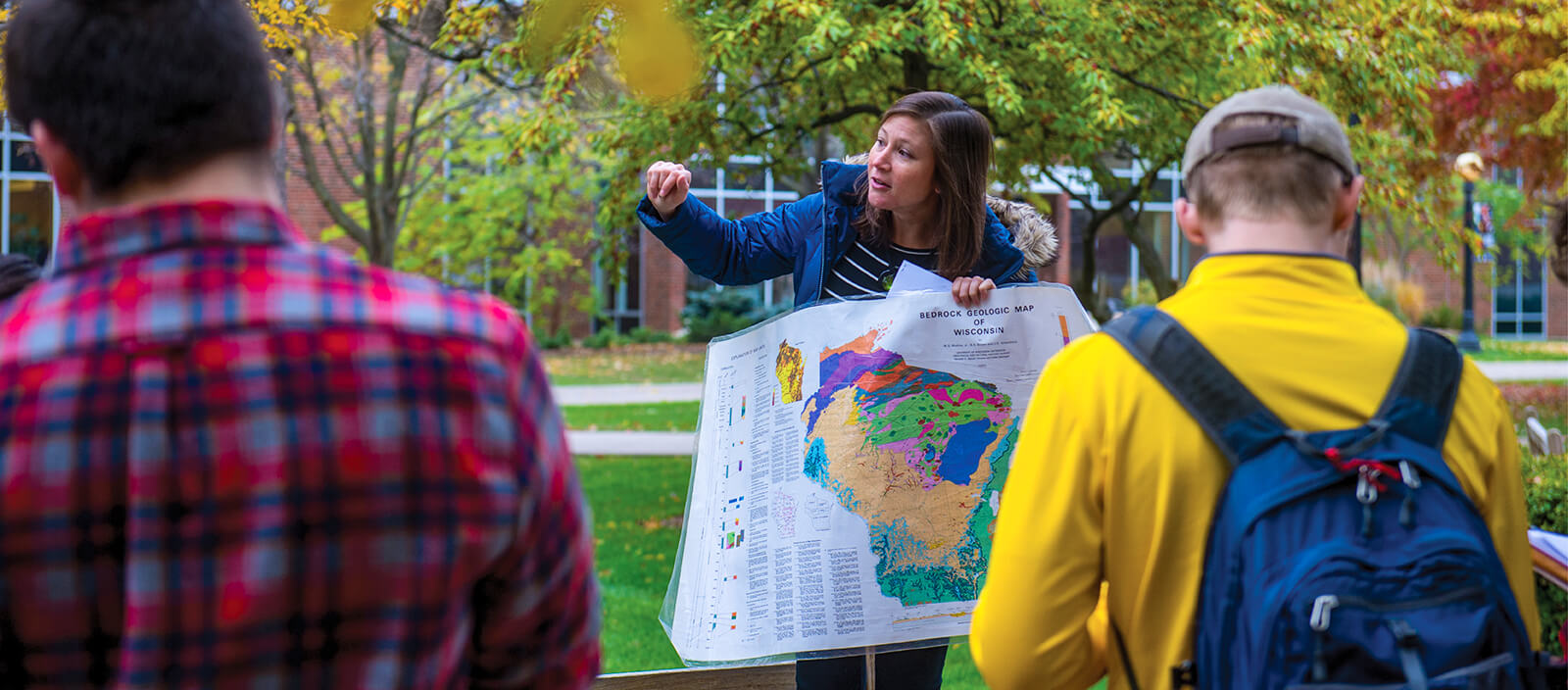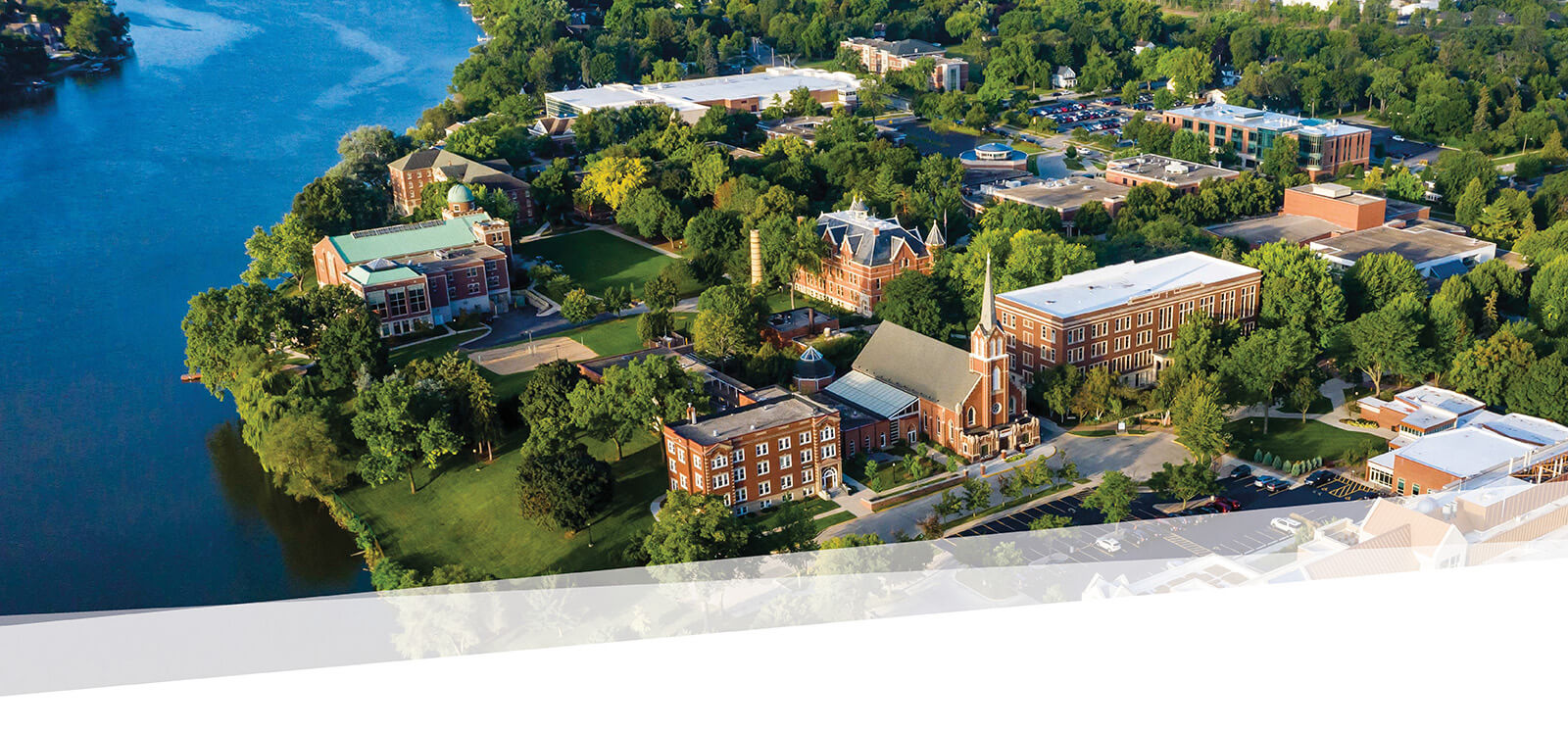

The earth tells a story: The physical, chemical and biological processes of its history are recorded in its layers. As a student majoring in earth science at St. Norbert College, you’ll learn how to decipher this structural history, gain a better understanding of the natural world and be prepared to engage in contemporary discussions about everything from water supply to energy production to climate change to natural disasters and much more.
But best of all? At SNC, you’ll get to play in the dirt! Most of our earth science courses encourage you to spend time outside, doing research. We believe that strong observational skills make for good earth scientists, and that the best way to gain those skills is through firsthand experience and field work.
When you major in earth science with either a geology or environmental geology concentration, you earn a Bachelor of Science degree that prepares you to enter the workforce, or to pursue graduate studies in earth science or other fields. There are opportunities in a variety of areas, including environment/geotechnical, energy/mining, education, federal and state agencies and education.
In addition to the earth science major, SNC offers both earth science and sustainability minors, designed for students in a variety of fields who have an interest in both the history and the future of our planet.
In addition to exciting lab and classroom work, an earth science education offers some of the college’s most dynamic learning opportunities beyond the classroom. Earth science is based on field experience, and SNC will get you out there, with field trips and digs throughout the U.S. and abroad. During the summer between your junior and senior year in college, you could spend five to eight weeks constructing geologic maps as part of a geology field camp.
The Geology Club regularly hosts speakers and organizes trips to sites of geological interest throughout the region, from Chicago’s Field Museum to Door County’s Cave Point and the iron mines of northern Wisconsin. SNC earth science majors publish their research on topics such as the paleoclimate of inland dunes, land use consequences for riparian ecosystems and teaching plate tectonics at the elementary school level. Considering studying abroad? SNC offers programs that include volcanology in the United Kingdom and oceanography in New Zealand.
Should you choose to continue your education after graduation, you’ll be happy to know that 65 percent of our earth science majors enter grad school with full financial assistantships – possibly the highest rate of any major at SNC. And as you’ll see below, job prospects are equally bright. Check out this unique story about five SNC alums in the earth science program (formerly geology) who all work for the same DNR division in Wisconsin.

Uncover new knowledge about earth science by engaging in collaborative research projects with your professors.
Learn more
Explore the field of earth science through internships, and find out what it’s like to put your academic training to work.
Learn more
Experience earth science from a global standpoint through our study abroad program.
Learn more
If there’s one thing that SNC professors and instructors have in common, it’s a passion for teaching and sharing their expertise. You’ll also find them dedicated to providing personalized guidance that supports your academic and career aspirations. Discover the distinguished scholars you’ll be learning from.


Earth science graduates will find rewarding work in a broad array of state and federal agencies – including the Wisconsin Department of Natural Resources, National Park Service and the Environmental Protection Agency – as well as environmental/geotechnical firms, energy/mining companies, and educational institutions.
Nationally, the employment growth rate for geoscientists in the United States is expected to increase by 5.1 percent from 2022-32, faster than the average for all. This growth rate is even higher when the field is narrowed to environmental scientists and specialists, with a projected growth rate of 6 percent from 2022-32.
Earth scientists work as:
Three-quarters of SNC earth science alumni who attend graduate school do so with full financial support through graduate teaching or research assistantships. They go on to study earth and planetary science, environmental science, sustainability, geosciences and hydrogeology. With SNC's excellent track record for prep and placement, a number of our undergraduate students have been accepted into prestigious graduate programs at:

Campus location
Ariens Family Welcome Center
310 College Ave.
De Pere, WI 54115
Hours of operation
Monday-Friday
8 a.m.-4:30 p.m.
We’re also available by appointment.
Mailing address
Office of Admission
St. Norbert College
Ariens Family Welcome Center
100 Grant St.
De Pere, WI 54115